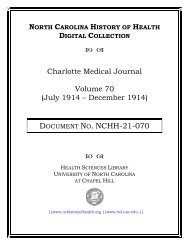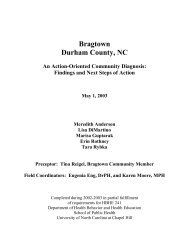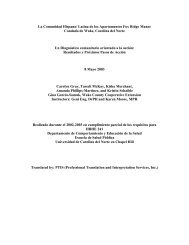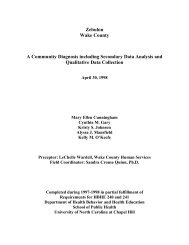- Page 1 and 2: NORTH CAROLINA HISTORY OF HEALTH DI
- Page 3 and 4: lARLOTTK MEDICAL lOURNAL. ^ SANMETT
- Page 5 and 6: THE CHARLOTTE MEDICAL JOURNAL. Chat
- Page 7 and 8: THE BABIES «HC thrive the best dur
- Page 9 and 10: VIII THE CHARLOIVTE MEDICAL JOURNAL
- Page 11 and 12: THK CHARLOTTE MEDICAL JOURNAL. MILK
- Page 13 and 14: THE CHARLOTTE MEDICAL JOURNAL. NEUR
- Page 15 and 16: PHF. CHARLOTTE MEDICAL JOURNAL. Atl
- Page 17 and 18: AKLOTTE MKDICAL JOl'KNAL E^legant P
- Page 19 and 20: THE CHARLOTTE MEDICAL JOURNAL. "We
- Page 21 and 22: ^^ THE CHARLOTTE MfiDICAL JOURNAL.
- Page 23 and 24: ' \ fth ORIGINAL COMMUNICATIONS.
- Page 25 and 26: ORIGINAL COMMUNICATIONS, 5 trate ul
- Page 27 and 28: ORIGINIAL COMMUNICATIONS. 7 careful
- Page 29 and 30: ; THE CHARLOTTE MEDICAL JOURNAL. 9
- Page 31 and 32: ORIGINAL COMMUNICATIONS. 11 tuber i
- Page 33 and 34: ORIGINAI, COMMCNICATIONS lo neum ab
- Page 35 and 36: The chief causative factors of gast
- Page 37: ORIGINAL COMMUNICATIONS. to adminis
- Page 41 and 42: ORIGINAL COMMUNICATIOXS, 21 process
- Page 43 and 44: OEIGINAI. COMMUNICATIONS. 23 down t
- Page 45 and 46: ORIGINAL COMMUNICATIOMS. 25 this In
- Page 47 and 48: ORIGINAL OOMJIUXICATION. 27 tro-int
- Page 49 and 50: ORIGIXAL COMMCNICATIONS. 29 the sam
- Page 51 and 52: ORIGINAL COMMUNICATIONS. 31 tioii.
- Page 53 and 54: EDITORIAL. 33 rUai'lriiio Lnai JOli
- Page 55 and 56: EDITORIAL. oD Ham Jones, of High Po
- Page 57 and 58: EDITORIAL. 37 Siler, of the U. S. A
- Page 59 and 60: 8. What is the differential diagnos
- Page 61 and 62: Edgar M. Long, Hamilton. Ben F. Roy
- Page 63 and 64: and H. A. Slack. "Infection and Imm
- Page 65 and 66: EDITORIAI,. 45 Dr. Claude N. Smith
- Page 67 and 68: I C. EDITORIAL. Association, the Am
- Page 69 and 70: REVIEW OF SOUTHERN MEDICAL LITERATU
- Page 71 and 72: REVIEW OF SOUTHERN- MEDICAL LITERAT
- Page 73 and 74: Book Notices. The Popes and Science
- Page 75 and 76: ADBVRTISEMENTS.
- Page 77 and 78: INDEX FOR JULY, Table of Contents f
- Page 79 and 80: ABSTRACTS Genielli, who is himself
- Page 81 and 82: ADVERTISEMENTS. St. Luke's Hospital
- Page 83 and 84: ADVERTISEMENTS. a mixture containin
- Page 85 and 86: ADVERTISEMENTS. SOUTHERN MEDICAL SO
- Page 87 and 88: »»< ADVERTISEMENTS. To obtain the
- Page 89 and 90:
— ADVERTISEMENTS. XXIX THE PINES,
- Page 91 and 92:
A most powerful non-toxic bacterici
- Page 93 and 94:
ADVERTISEMENTS. The Sarah Leigh Hos
- Page 95 and 96:
ADVERTISEMENTS. Baby needs Mellin's
- Page 97 and 98:
ADVERTISEMENTS. MALT WIXH REPRESENT
- Page 99 and 100:
^/^ ADVERTISEMENTS Aseptinol Manufa
- Page 101 and 102:
ADVERTISEMENTS. The State Examining
- Page 103 and 104:
Much better results will be obtaine
- Page 105 and 106:
ADVERTIESMENTS, r^mmmmmmmmmmm^mmm^m
- Page 107 and 108:
ADVERTISKEMTS '^he niGKSMITH HOSPIT
- Page 109 and 110:
VDVERTISEMEXTS ERUPTION^ Inflammati
- Page 111 and 112:
ADVERTISEMENTS. The Success of List
- Page 113 and 114:
Jlnnomicemeiit to the medical Profc
- Page 115 and 116:
ttiiALIH AFFAiRS LIBRARY Charlotte
- Page 117 and 118:
ADVERTISEMENTS. F>OST -TTPHOI RECON
- Page 119 and 120:
C ADVERTISEMENTS. BOVININE Reconstr
- Page 121 and 122:
ADVERTISEMENTS. Successfully Prescr
- Page 123 and 124:
ADVERTISEMENTS ^--«*»i^ui4 >Ji^Wo
- Page 125 and 126:
\ ADVERTISEMENTS. Significant Requi
- Page 127 and 128:
Peak's Supporter ADVERTISEMENTS. Fo
- Page 129 and 130:
ADVERTISEMENTS. P0ST=0PERAT1VE CONV
- Page 131 and 132:
% ADVERTISEMNTS. PROFESSIONAL CARDS
- Page 133 and 134:
ADVERTISEMENTS. THE SPECIJIL FIELD
- Page 135 and 136:
IN ADVERTISEMENTS ALBUMINURIA OF BR
- Page 137 and 138:
The Charlotte Medical Journal Some
- Page 139 and 140:
for typhoid anti-bodies the destruc
- Page 141 and 142:
ORIGINIAI. COMMfNICATIONS. h.'l isu
- Page 143 and 144:
ORIGINAL COMMUNICATION. 6/ cine. I
- Page 145 and 146:
ORIGINAL COMMUNICATIONS. 69 membran
- Page 147 and 148:
ORIGINAL COMMUNICATIONS. 71 ^ive US
- Page 149 and 150:
ORIGINAL COMMUNICATIONS subject of
- Page 151 and 152:
ORIGINAL COMMUNICATIONS. 75 toxins.
- Page 153 and 154:
ORIGINAL COMMUNICATIONS, 77 tions a
- Page 155 and 156:
ORIGINAL COMMUNICATIONS. 79 tion or
- Page 157 and 158:
ORIGINAI, COMMUNICATIONS. 81 typhoi
- Page 159 and 160:
' first I in ' more I I been I youn
- Page 161 and 162:
ORIGINAL COMMUNICATIONS.
- Page 163 and 164:
ORIGINAL COMMUNICATIONS. .S7 Like m
- Page 165 and 166:
ORIGINAL COMMUNICATIONS. 89 as to t
- Page 167 and 168:
ORIGINAL COMMUNICATIONS. 91 as we h
- Page 169 and 170:
ORIGINAL COMMUNICATIONS. 93 ena sim
- Page 171 and 172:
effects of antitoxin treatment and
- Page 173 and 174:
EDITORIAL. JamesBarrinalectureon J/
- Page 175 and 176:
EDITORIAL. 99 logically what hither
- Page 177 and 178:
EDITORIAL. the father did not influ
- Page 179 and 180:
EDITORIAL. 103 quently they repeate
- Page 181 and 182:
J treatment of alcohol and drug add
- Page 183 and 184:
with their wives, daughters and inv
- Page 185 and 186:
Countv: Dr. \V. H. Ward, Plymoulli,
- Page 187 and 188:
REVIEW OF SOUTHERN -MEDICAL LITERAT
- Page 189 and 190:
REVIEW OF SOUTHERN MEDICAL LITERATU
- Page 191 and 192:
REVIEW OF SOUTHERN MEDICAL LITERATU
- Page 193 and 194:
Book Notices. Treatment of the Dise
- Page 195 and 196:
BOOK NOTICES. 119 rations and to th
- Page 197 and 198:
ABSTRACTS. 121 , women are subject
- Page 199 and 200:
ADBVETISEMENTS. The Girculatorj Dan
- Page 201 and 202:
. ABSTRACTS. of the rectus. This op
- Page 203 and 204:
INDEX FOR AUGUST. Table of Contents
- Page 205 and 206:
m^% ./AMENORRHEA DYSMENORRHEA -": M
- Page 207 and 208:
ADVERTISEMENTS. 131 THE CHARLOTTE S
- Page 209 and 210:
^tttmai Attest ADVERTISBMRNT3. To o
- Page 211 and 212:
ADVERTISHEMTS flp?!lj!uco?ie A most
- Page 213 and 214:
ADVERTISEMENTS. St, Luke's Hospital
- Page 215 and 216:
' > ' " ' ADVERTISEMENTS. >^^_ ,i&-
- Page 217 and 218:
I «43«« ADVERTISEMENTS. MALT IRO
- Page 219 and 220:
:': rflflN m WEflKEiT utih- ^ Z^flM
- Page 221 and 222:
ADYERTIESMEWTS, Inflammation's Anti
- Page 223 and 224:
This is the Food for your baby pati
- Page 225 and 226:
VDVERTISEMENTS ERUPTIONS Inflammati
- Page 227 and 228:
ADVERTISEMENTS The Success of Liste
- Page 229 and 230:
SOUTHERN MEDICAL SOCIETIES. MISSISS
- Page 231 and 232:
-'" f^i-r/\jRs ^IBR/{}^Y jharlotte
- Page 233 and 234:
. // is a fact that ADVERTISEMENTS.
- Page 235 and 236:
C ADVERTISEMENTS. BOVININEI Reconst
- Page 237 and 238:
ADVERTISEMENTS. ^11 the tfc® Nmtur
- Page 239 and 240:
ADVERTISEMENTS Is pre-eminently ser
- Page 241 and 242:
ADVERTISEMENTS, Milk prepared with
- Page 243 and 244:
f ^ Peak's /^^^*=^=^\ Supporter ADV
- Page 245 and 246:
ADVERTISEJIENTS. BUFFALO LITHIA SPR
- Page 247 and 248:
ADVERTISEMNTS. I PROF ESSIONAL C AR
- Page 249 and 250:
Intestinal ADVERTISEMENTS. ^ '"°'"
- Page 251 and 252:
Oar ADVERTISEMENTS THE CHILD THAT F
- Page 253 and 254:
The Charlotte Medical Journal Antit
- Page 255 and 256:
ORIGINAI, COMMUNICATIONS. 139 tinuo
- Page 257 and 258:
ORIGINAL COMMUNICATIONS. 141 tiiict
- Page 259 and 260:
ORIGINAL COMMUNICATIONS. 143 by Shu
- Page 261 and 262:
ORIGINAL COMMUNICATION. 145 can be
- Page 263 and 264:
ORIGINAL COMMUNICATIONS. 147 Americ
- Page 265 and 266:
ORIGINAL COMMl'NICATIONS. 149 senti
- Page 267 and 268:
The reason for this is that the blo
- Page 269 and 270:
ORIGINAL COMMUNICATIONS. 153 chroni
- Page 271 and 272:
ORIGINAI, COMMUNICATION. 155 diment
- Page 273 and 274:
ORIGINAI. COMMUNICATIONS. 157 maind
- Page 275 and 276:
Charlotte Medical Journal EDITORIAL
- Page 277 and 278:
' attention, of the ray, and must t
- Page 279 and 280:
EDITORIAL. 163 one of the most sign
- Page 281 and 282:
165 morbidity from this disease. Ev
- Page 283 and 284:
North Carolina Medical College Open
- Page 285 and 286:
REVIEW OF SOUTHERN MEDICAL, LITERAT
- Page 287 and 288:
REVIEW OF SOUTHERN MEDICAI. LITERAT
- Page 289 and 290:
REVIEW OF SOUTHERN MEDICAI, LITERAT
- Page 291 and 292:
BOOK NOTICES which he lives, etc.,
- Page 293 and 294:
Prognosis In Tetanus.—Patton in T
- Page 295 and 296:
ABSTRACTS. 179 amination of every o
- Page 297 and 298:
ABSTRACTS. 181 Opium in the Therape
- Page 299 and 300:
ABSTRACTS 18,5 pleural pain, and wa
- Page 301 and 302:
ABSTRACTS. 185 been removed by lith
- Page 303 and 304:
ABSTRACT. 187 a general peritonitis
- Page 305 and 306:
Of the patients three were spinster
- Page 307 and 308:
ABSTRACTS. 191 —minimal dazzling,
- Page 309 and 310:
' ABSTRACTS. • 193 cellulofibrino
- Page 311 and 312:
ABSTRACTS. 195 George Lincoln Walto
- Page 313 and 314:
AD8VRTISBMBNTS. 197
- Page 315 and 316:
ABSTRACTS. juprarenalis. The thyroi
- Page 317 and 318:
TABLE OF CONTENTS FOR SEPTEMBER. Ta
- Page 319 and 320:
ion ceosed rather abruptly above at
- Page 321 and 322:
to heal the sick man as to maintain
- Page 323 and 324:
THE ADVERTISEMENTS. CHARLOTTE SANAT
- Page 325 and 326:
**< I mi ADVERTISEMENTS. To obtain
- Page 327 and 328:
W^mB ADVERTISEEMTS A most powerful
- Page 329 and 330:
ADVERTISEMENTS. St. Luke's Hospital
- Page 331 and 332:
UNpT. il ADVERTISEMENTS. Aseptinol
- Page 333 and 334:
ADVERTISEMENTS. ^^^2ZSi^^ aohannfoj
- Page 335 and 336:
If Interested "^Ewp FOR Samples h L
- Page 337 and 338:
^-MiMi^^ ADVERTIESMENTS, (Inflammat
- Page 339 and 340:
A physiologi- cally correct food. A
- Page 341 and 342:
VDVERTISEMENTS ERUPTIONvS Inflammat
- Page 343 and 344:
ADVERTISEMENTS The Success of Liste
- Page 345 and 346:
SOUTHERN MEDICAL SOCIETIES, MISSISS
- Page 347 and 348:
ADVERTISEMENTS. In TREATING BRONCHI
- Page 349 and 350:
c ADVERTISEMENTS. BOVmiNE Reconstru
- Page 351 and 352:
ADVERTISEMENTS. Does not cause the
- Page 353 and 354:
lDVERTISEMENTS Is physiologically a
- Page 355 and 356:
ADVERTISEMENTS, IX PANOPEPTON Consi
- Page 357 and 358:
^ Peak's \ Supporter ADVERTISEMENTS
- Page 359 and 360:
ADVERTISEMENTS. BUFFALO LITHIA SPRI
- Page 361 and 362:
—— ADVERTISEMNTS. I PROF ESSION
- Page 363 and 364:
Intestinal ADVERTISEMENTS. Dyspepsi
- Page 365 and 366:
ADVERTISEMENTS NEURASTHENIC "BREAKD
- Page 367 and 368:
The Charlotte Medical Journal Vol.
- Page 369 and 370:
ORIGINAL COMMUNICATIONS. 215 a dise
- Page 371 and 372:
ORIGINAL COMMUNICATIONS, 217 any of
- Page 373 and 374:
ORIGINAL COMMUNICATION. 2l9 accurac
- Page 375 and 376:
ORIGINIAL COMMUNICATIONS. 221 of an
- Page 377 and 378:
ORIGINAL COMMUNICATIONS. 223 in spi
- Page 379 and 380:
ORIGINAL COMMUNICATIONS. 225 i the
- Page 381 and 382:
ORIGINAL CO.MMUNICATIONS. 227 branc
- Page 383 and 384:
ORIGINAL COMMUNICATIONS. 229 where
- Page 385 and 386:
ORIGINAL COMMUNICATIONS. 231 the dr
- Page 387 and 388:
1 fraction ORIGINAL COMMUNICATIONS.
- Page 389 and 390:
ORIGINAL COMMUNICATIONS. 235 But th
- Page 391 and 392:
. ORIGINAL COMMUNICATIONS. ant ones
- Page 393 and 394:
ORIGINAL COMMUNICATIONS, 239 aftern
- Page 395 and 396:
ORIGINIAL COMMUNICATIONS. 74 J firs
- Page 397 and 398:
Charlotte of t^^e Medical problem J
- Page 399 and 400:
works, making a total of 21n deaths
- Page 401 and 402:
DR. ll^o^^'OK COOK, DISCOVERER, lie
- Page 403 and 404:
EDITORIAL. 249 of a tetanic nature.
- Page 405 and 406:
EDITORIAL. T-< ^^:hjS^^' ->^'- - S-
- Page 407 and 408:
J I Board i the EDITORIAL. 253 affo
- Page 409 and 410:
REVIEW OF SOUTHERN MEDICAL LITERATU
- Page 411 and 412:
A Case ol BaclIIary Infection of th
- Page 413 and 414:
ABSTRACTS. indicates that a point n
- Page 415 and 416:
ABSTRACTS. 261 should be added thos
- Page 417 and 418:
ABSTRACTS. 263 sat up ill bed on th
- Page 419 and 420:
ABSTRACT. 7^5 sore throat that are
- Page 421 and 422:
ACTS 267 The Etiology ot So-Called
- Page 423 and 424:
nig of the spongy layer. This occur
- Page 425 and 426:
ABSTRACTS 271 1 It should be so adm
- Page 427 and 428:
AUBVKTISEMENTS. A considerable prop
- Page 429 and 430:
iig, immediate ligature is preferab
- Page 431 and 432:
TABLE OF CONTENTS FOR OCTOBER. 277
- Page 433 and 434:
ufactui^i, Katherine L. Storms, M.
- Page 435 and 436:
ABSTRACTS. Electricity in Ibe Diagn
- Page 437 and 438:
ADVERTISEMENTS. THE CHARLOTTE SANAT
- Page 439 and 440:
ADVERTISEMRNTS. B-^^'^»^BS fa For
- Page 441 and 442:
ADVKRTlSHK.MTS A most powerful non-
- Page 443 and 444:
ADVERTISEMENTS. St Luke's Hospital
- Page 445 and 446:
ADVERTISEMENTS. Ascftinol Manufactu
- Page 447 and 448:
— ADVERTISEMENTS. MALT WITH REPRE
- Page 449 and 450:
^E BRIDGE BETWEEN DI6EA5E and MEALT
- Page 451 and 452:
ADVERTIESMENTS, HUMAN HANDS HAVE NO
- Page 453 and 454:
ADVERTISEMENTS. You are more assure
- Page 455 and 456:
VDVERTISEMENTS The First Applicatio
- Page 457 and 458:
ADVERTISEMENTS The Success of Liste
- Page 459 and 460:
SOUTHERN MEDICAL SOCIETIES, MISSISS
- Page 461 and 462:
'^"^^*^'^3«»v Iharlotte Medical J
- Page 463 and 464:
ADVERTISEMENTS. Id MEET Yhreatening
- Page 465 and 466:
ADVERTISEMENTS. i=[>iui;ii;ij wm Re
- Page 467 and 468:
ADVERTISEMENTS. Successfully Prescr
- Page 469 and 470:
ADVERTISEMENTS ^-Xc^xjui'sJiJ^tenoi
- Page 471 and 472:
THE I "I I) ADVERTISEMENTS, s Essen
- Page 473 and 474:
TASTELESS ADVERTISEMENTS. WHY Water
- Page 475 and 476:
ADVERTISEMENTS. XIII LITHIA SPRINGS
- Page 477 and 478:
ADVERTISEMNTS. ? :$:?: - >:?:$: - >
- Page 479 and 480:
t^-^-''' ADVERTISKiMENTS. >r,T-ini
- Page 481 and 482:
lDVERTISEMENTS THE ILLS Oh THE AGED
- Page 483 and 484:
; !;> The Charlotte Medical Journal
- Page 487 and 488:
ORIGINAL COMMUNICATIONS. 291 that a
- Page 489 and 490:
ORIGINAL CO.MMCNICATIONS. 203 pubii
- Page 491 and 492:
ORIGINAL CO^niUNICATIONS. 295 quack
- Page 493 and 494:
ORIGINAL COMMUNICATIONS. 297 sand o
- Page 495 and 496:
ORIGINAL COMMUNICATIONS. 299 stitut
- Page 497 and 498:
a unit work to this end and it will
- Page 499 and 500:
ORIGINAL COMMUNICATIONS. nobility.
- Page 501 and 502:
ORIGINAL COMMUNICATIONS 30S covered
- Page 503 and 504:
ORIGINAL COMMUNICATION. 307 of the
- Page 505 and 506:
, ORIGINAL COMMUNICATIONS. 309 u- i
- Page 507 and 508:
KDITORIAL. Charlotte Medical Journa
- Page 509 and 510:
EDITORIAL. 313 assumption on the ph
- Page 511 and 512:
EDITORIAL. 315 definite locations,
- Page 513 and 514:
EDITORIAL. -,jy '^ """''"' S. C.i D
- Page 515 and 516:
EDITORIAL. AI
- Page 517 and 518:
EDITORIAL. 321 EDITORIAL NEWS ITEMS
- Page 519 and 520:
EDITORIAL. 323 solely of addresses
- Page 521 and 522:
EDITORIAL. -,,r Soci^r'"'' '' ''" '
- Page 523 and 524:
ABSTRACTS. 397 the iiKliyidual girl
- Page 525 and 526:
ABSTRACTS 329 ble nurse—provided
- Page 527 and 528:
ABSTRACTS. ^'°" '''" ^"^' ""^'^ °
- Page 529 and 530:
BOOK NOTICES -,.. of Preventive Med
- Page 531 and 532:
ABSTRACTS. hyj,e,nc pnncples. Where
- Page 533 and 534:
ABSTRACTS. 337 spinal fluid of epil
- Page 535 and 536:
ABSTRACTS. -,^q in which, in anv ev
- Page 537 and 538:
ABSTRACTS. 341 then there has been
- Page 539 and 540:
ABSTRACTS 343 Antilormln in the Det
- Page 541 and 542:
I harmless. I peculiarly Calcium Sa
- Page 543 and 544:
ABSTRACTS. :over chancres on the li
- Page 545 and 546:
AUEVKTISE.MliNTS. 349 A considerabl
- Page 547 and 548:
REVIEW OF SOUTHERN MEDICAI, LITERAT
- Page 549 and 550:
TABLE OF CONTENTS FOR NOVEMI Table
- Page 551 and 552:
REVIEW OF SOUTHERN MEDICAL LITERATU
- Page 553 and 554:
REVIEW OF SOUTHERN MEDICAL LITERATU
- Page 555 and 556:
ABSTRACTS. 359 DOCTOR: OUR RESPIRAZ
- Page 557 and 558:
ADVERTISEMKNTS. For Upwards of Fort
- Page 559 and 560:
ADVERTISHEMTS A most powerful non-t
- Page 561 and 562:
ADVERTISEMENTS. St. Luke's Hospital
- Page 563 and 564:
Balttmore^Md. Pine Rid^e Sanitoriii
- Page 565 and 566:
ADVERTISEMENTS. Bt-a—ygr-n^TT^fl
- Page 567 and 568:
fflflN ITi WEflKEJT UNK- IT 15 NOT
- Page 569 and 570:
ADVERTIESMENTS, HUMAN HANDS HAVE NO
- Page 571 and 572:
ADVERTISEMENTS. after circumcision
- Page 573 and 574:
VDVERTISEMENTS Instantaneous Is the
- Page 575 and 576:
ADVERTISEMENTS The Success of Liste
- Page 577 and 578:
SOUTHERN MEDICAL SOCIETIES. MISSISS
- Page 579 and 580:
Charlotte Medical Journal. A SOUTHE
- Page 581 and 582:
ADVERTISEMENTS. lo Meet Ihreateninc
- Page 583 and 584:
c ADVERTISEMENTS. BOyiNINE Reconstr
- Page 585 and 586:
ADVKRTISEMENTS. A.II the i« ^mdL®
- Page 587 and 588:
ADVERTISEMENTS DR. STEEDLY'S PRIVAT
- Page 589 and 590:
ADVERTISEMENTS, Fairchild's Essence
- Page 591 and 592:
ADVERTISEMENTS. W LgLtest Scientifi
- Page 593 and 594:
BUFFALO ADVERTISEMENTS. XIII ALBUMI
- Page 595 and 596:
ADVERTISEMNTS. I PROF ESSIONAL CARD
- Page 597 and 598:
OE3 ADVERTISEMENTS. I o n Quihgesim
- Page 599 and 600:
ADVERTISEMENTS THE ANEMIA OF BRIGHT
- Page 601 and 602:
j j 1 The Charlotte Medical Journal
- Page 603 and 604:
ORIGINAI, COMMUNICATIONS 367 diagno
- Page 605 and 606:
— ORIGINAL COMMUNICATIONS. 369 Dr
- Page 607 and 608:
ORIGINAL COMMUNICATIONS. !...v.ed I
- Page 609 and 610:
ORIGINAL COMMUNICATION. 373 Iter in
- Page 611 and 612:
ORIGINAL COMMUNICATIONS. 375 )f the
- Page 613 and 614:
ORIGINAL COMMUNICATIONS. 377 no occ
- Page 615 and 616:
ORIGINAL COMMUNICATIONS --n ^U.: ra
- Page 617 and 618:
ORIGINAL COMMUNICATIONS. 381 ffiveh
- Page 619 and 620:
ORIGINAL COMMUNICATIONS. 383 i desi
- Page 621 and 622:
, ORIGINAL COMMUNICATIONS, ."iS.S o
- Page 623 and 624:
ORIGINIAL COMMUNICATIONS. .'iS? is
- Page 625 and 626:
EDITORIAL. .389 Charlotte ture prop
- Page 627 and 628:
EDITORIAL. 391 ation of information
- Page 629 and 630:
EDITORIAL. 393 decrease of urinary
- Page 631 and 632:
[ ! his I to DK. RUSSEUU MOVES TO f
- Page 633 and 634:
man and Dr. li. Eugene Mitchell, of
- Page 635 and 636:
. EDITORIAL. 3^9 J. S. Wynne, Dr. A
- Page 637 and 638:
EDITORIAL. 40] . ; . ellagra," Dr.
- Page 639 and 640:
REVIEW OF SOUTHERN MEDICAL LITERATU
- Page 641 and 642:
BOOK NOTICES 405 . 1 This book is i
- Page 643 and 644:
ABSTRACTS. 407 ical Society, contri
- Page 645 and 646:
ABSTRACTS 409 Certain Bacillus Coll
- Page 647 and 648:
ABSTRACTS. at this Stage to check t
- Page 649 and 650:
Bl^tr:i:^i^e:S':::r^^'^:^: ;J;-Pati
- Page 651 and 652:
ABSTRACTS. 415 tastases and recurre
- Page 653 and 654:
Clinical ADEVRTISEMENTS. FUNCTIONAL
- Page 655 and 656:
ADVERTISEMENTS. 419 ra For Upwards
- Page 657 and 658:
Tblosinamlne In Deafness.— Mollis
- Page 659 and 660:
p was a notorious one. He not only
- Page 661 and 662:
TABLE OF CONTENTS FOR VOLUMI Table
- Page 663 and 664:
py, bv Edwin Henry 8cborer, M. !) U
- Page 665 and 666:
tZ^ ADVEKTISEMKNTS. A Post Graduate
- Page 667 and 668:
fidgetiness, especially at night. T
- Page 669 and 670:
I actually I ! tion i dition j I be
- Page 671 and 672:
ADVERTISEMENTS. DOCTOR: OUR RESPIRA
- Page 673 and 674:
ADVERTISEMKKTS, 4,37 A S-Pheu, form
- Page 675 and 676:
ADVKKTISKHMTS A most powerful non-t
- Page 677 and 678:
ADVERTISEMENTS. St. Luke's Hospital
- Page 679 and 680:
:«^ ADVERTISEMENTS. 'Ai Asepttnol
- Page 681 and 682:
VDVERTISEMENTS The First Applicatio
- Page 683 and 684:
Ir Interested Send for Smpics n LiT
- Page 685 and 686:
ADVIiRTIESMENTS, HUMAN HANDS HAVE N
- Page 687 and 688:
I 'A ADVERTISEMENTS. For your littl
- Page 689 and 690:
m I Sy R E P R E S E NTS THE M O ST
- Page 691 and 692:
ADVERTISEMENTS The Success of Liste







![Bulletin of the North Carolina Board of Health [serial] - University of ...](https://img.yumpu.com/48032016/1/153x260/bulletin-of-the-north-carolina-board-of-health-serial-university-of-.jpg?quality=85)
![The Health bulletin [serial] - University of North Carolina at Chapel Hill](https://img.yumpu.com/47603625/1/169x260/the-health-bulletin-serial-university-of-north-carolina-at-chapel-hill.jpg?quality=85)
![The Health bulletin [serial] - University of North Carolina at Chapel Hill](https://img.yumpu.com/47242858/1/169x260/the-health-bulletin-serial-university-of-north-carolina-at-chapel-hill.jpg?quality=85)
![The Health bulletin [serial] - University of North Carolina at Chapel Hill](https://img.yumpu.com/43204263/1/172x260/the-health-bulletin-serial-university-of-north-carolina-at-chapel-hill.jpg?quality=85)
![The Health bulletin [serial] - University of North Carolina at Chapel Hill](https://img.yumpu.com/41981074/1/163x260/the-health-bulletin-serial-university-of-north-carolina-at-chapel-hill.jpg?quality=85)

![The Health bulletin [serial] - University of North Carolina at Chapel Hill](https://img.yumpu.com/40912928/1/164x260/the-health-bulletin-serial-university-of-north-carolina-at-chapel-hill.jpg?quality=85)

![The Health bulletin [serial] - University of North Carolina at Chapel Hill](https://img.yumpu.com/35643061/1/167x260/the-health-bulletin-serial-university-of-north-carolina-at-chapel-hill.jpg?quality=85)
![Biennial report of the North Carolina State Board of Health [serial]](https://img.yumpu.com/34024350/1/166x260/biennial-report-of-the-north-carolina-state-board-of-health-serial.jpg?quality=85)
